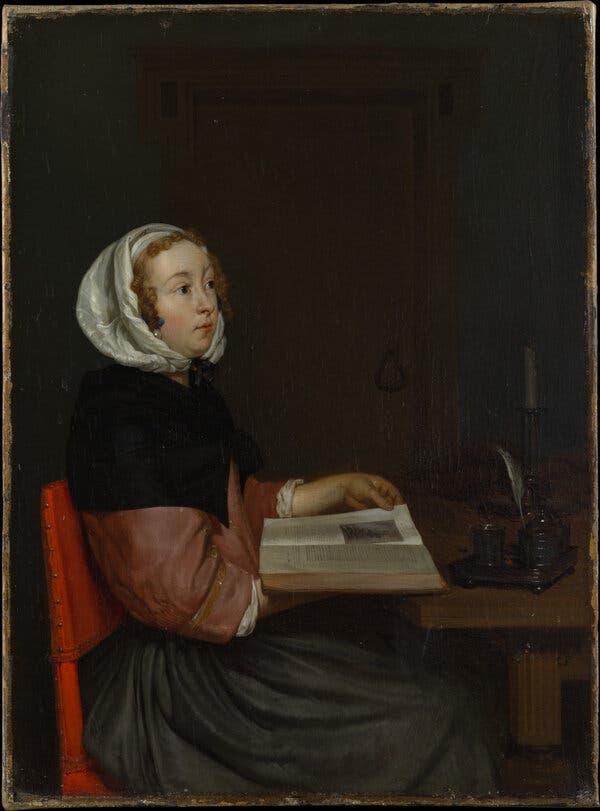Molly recommends a 19th-century “Dumb and Dumber” and a collection of essays about the weirder corners of the business world.

Dear readers,
For reasons too tedious to type much less force you to read, I spent a lot of time last month in waiting rooms. In one of these rooms I began to ruminate (angrily) on a paradox of waiting, which is that in order to escape its misery you need to become wrapped up in something else, and yet the state of waiting thwarts distraction because waiting is itself an all-consuming activity — one dominated by the alpha and omega questions of “How long have I been waiting?” and “How much longer will I have to wait?”
Only after the waiting necessities were over did I stumble upon not one but two books that may have smashed the paradox. D’oh. The titles below are amusing and episodic and easy to consume piecemeal; how I wish I could time-travel back and plant them in my purse. Ah, too late. But not for you!
Happy thumb-twiddling,
Molly
“Bouvard and Pécuchet,” by Gustave Flaubert
Fiction, originally published 1881
Some may point to the bestowing of the National Book Award or the Nobel Prize in Literature as the year’s biggest book-related event, but for me it was the discovery that Flaubert wrote a 19th-century antecedent of “Dumb and Dumber.” The antecedent is “Bouvard and Pécuchet”… the impact was shattering … the laughs, nonstop.
It’s a picaresque, so the plot is less an arc than a spaghetto, but here it is: Two middle-aged Parisian idiots meet in 1838 and become best friends. The two share a passion for knowledge and an inability to retain or employ it. One of them suddenly inherits a packet of money and both quit their office jobs to move to a small Norman village together — “We’ll do whatever we please! We’ll grow beards!” — where they devote themselves to the mastery of various pursuits: gardening, animal husbandry, archaeology, chemistry, geology, politics. All pursuits end in catastrophe. It’s a choleric but affectionate mockery of bourgeois stupidity and the practice of self-improvement — and also, perhaps, of the concept of a “self” upon which one ought to be constantly improving.
Flaubert died before completing the novel and it seems like the sort of project that could indeed kill an author: excessive, fact-filled, bursting with conviction.
Read if you like: Elif Batuman, Vladimir Nabokov’s “Pnin,” being seized by strong emotions, behaving disastrously, remaining undeterred
Available from: Your library or local bookshop. A newer (than my copy above) translation by Mark Polizzotti was released in 2005 and is very good.
“The Man Who Invented Saturday Morning,” by David Owen
Essays, 1988
In this case you absolutely can judge a book by its cover. Those bubble letters don’t lie; “The Man Who Invented Saturday Morning” is, above all, fun.
The pieces assembled were originally published in Harper’s and The Atlantic, and there’s no through line among the topics — which include the toy industry, multilevel marketing, trade magazines, the enduring phenomenon of work spouses, Beatles fanhood, xerography and innovations in frozen food — other than David Owen’s interest, which is more than enough. He is a superbly witty noticer of things: an attractive quality in essayists since the dawn of essays.
The most delightful of the pieces (and it is a stiff competition) documents Owen’s voyage to St. Louis to attend a convention for people whose job it is to plan conventions: “A meeting of professional meeting planners is one of those rare and wonderful phenomena — like the alignment of all nine planets on the same side of the sun — that tingle with cosmic portent.” Is it ever.
Read if you like: Dreaming up business ideas, roaming the untamed corners of Wikipedia, chatting up strangers, “Jeopardy!”
Available from: Check your local used bookstore or go prowling on eBay; this one appears to be out of print but copies are floating around.
Why don’t you …
-
Forgive yourself in advance for botching the pronunciation of “Janwillem van de Wetering” and simply revel in his Amsterdam crime series? There are enough installments that it could constitute a whole winter hobby, if you’re in the market for one. This is the first title in the series, but you may wish to swing by your library and see what’s on the shelf — they don’t need to be read in order.
-
Giggle and gasp and wallow in contingency alongside Elena Malatesta, the heroine of Geoff Cebula’s campus comedy/horror novel “Adjunct”? Elena is an instructor of Italian at a college whose administration is shaving all non-lucrative departments — e.g. Italian — to the bone. When her colleagues in other budgetarily threatened fields start getting killed, Elena questions whether the slayings are motivated by bloodlust or rational careerism. From all outward signs this quirky murderfest appears to be self-published, which is the coolest form of publishing. (No offense to publishers. Well, offense to some of you.)
-
Pick up this Rachel Cusk novel about messy wealthy people in the English countryside once you’ve completed all the Iris Murdoch novels concerning that same demographic? But wait — has anyone in history ever done so? Just when I think I’ve defeated the endless Murdoch canon, some overlooked paperback leaps out from a bargain bin to taunt me …
Thank you for being a subscriber
Plunge further into books at The New York Times or our reading recommendations.
If you’re enjoying what you’re reading, please consider recommending it to others. They can sign up here. Browse all of our subscriber-only newsletters here.
Friendly reminder: check your local library for books! Many libraries allow you to reserve copies online.
